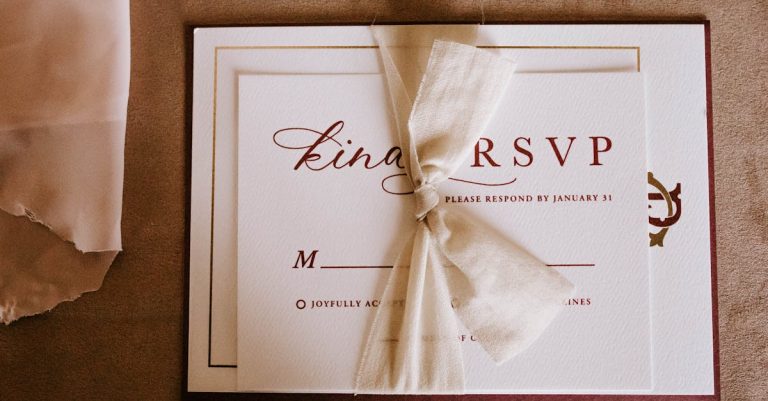
Planning a wedding is an exciting journey, but before you can say “I do”, there’s an important legal step to complete, giving notice of marriage. This process isn’t just a formality; it’s a requirement to ensure your marriage complies with the law. It involves answering a series of straightforward questions to confirm your eligibility to marry and to provide key details about you and your partner.
During this appointment, the registrar will ask about personal information like your full name, age, occupation and address, as well as similar details about your partner. You’ll also need to declare your marital status, intended wedding venue and confirm there’s no prohibited relationship between you. While it might sound daunting, it’s a simple and structured process designed to protect the integrity of your union.Understanding what to expect can help you feel more prepared and confident as you take this important step towards your big day.What Does Giving Notice Of Marriage Involve?
Giving notice of marriage is a vital legal step that declares your intention to marry in the UK. This process enables local authorities to document your intent and gives the public an opportunity to raise any legal objections.You and your partner must book an appointment with a Superintendent Registrar at the local registry office in the district where you live. If you live in separate districts, you both need to attend separate notices at your respective registry offices. You can only give notice if both parties are free to marry and are entering the union willingly.During the appointment, you’ll provide key details, such as your full names, ages, occupations, nationalities, addresses, marital statuses, and the proposed wedding venue. The information is crucial for verifying your eligibility and ensuring all legal requirements are met. For example, if you decide to change your venue after giving notice, you’ll need to re-submit your notice.Once completed, your notice will be displayed publicly in your registration district for 28 days. This waiting period allows time for any valid objections. If you’re a foreign national subject to immigration controls, the waiting period may extend to 70 days, depending on the Home Office referral scheme.The process includes a statutory fee of £42 per person, which increases slightly to £57 if you’re subject to the referral scheme. Remember to bring the required documentation, such as proof of identity, address, and any relevant legal paperwork, to ensure the process runs smoothly.When And Where Should You Give Notice?
Giving notice of marriage in the UK is a legal requirement. You must provide notice at a register office in the district where you live, confirming your intention to marry or form a civil partnership.Who Needs To Attend The Appointment?
You and your partner must attend the appointment in person. If either of you cannot attend, the notice won’t be accepted. The process requires your signatures, serving as a legal declaration that you are both free to marry. If either partner is under 18, a parent or legal guardian must complete additional forms provided by the registrar.What If You And Your Partner Live In Different Areas?
If you and your partner reside in different districts, each of you must attend a separate appointment at the register office in your respective district. You each provide notice individually, and both notices must be issued before your marriage can proceed. Ensure you’re prepared by bringing the necessary documentation to both appointments.Documents You Need To Provide
When giving notice of marriage, it’s crucial to provide specific documents verifying your identity, address, and eligibility to marry. Bringing the right documentation ensures a smooth process.Proof Of Identity And Address
Proof of identity typically includes a valid passport, full birth certificate showing parental details (if born after 1983 without an EU passport), or any valid photo ID like a driving licence. For proof of address, acceptable documents include a recent bank statement (dated within one month), a council tax bill (dated within the last year), or two separate utility bills issued in the past three months. Ensure the information is up-to-date and matches your personal details.Documentation For Previous Marriages Or Civil Partnerships
If you’ve been married or in a civil partnership before, provide evidence that it’s legally ended. Required documents may include a Decree Absolute or Final Order for divorce or a death certificate of your former spouse. Ensure foreign divorce documents are translated into English if applicable. A fee of £55 or £83, depending on circumstances, applies for processing foreign divorces. Bring a bank card for payment, as cash isn’t accepted.Specific Requirements For Foreign Nationals
For non-British nationals, additional documentation is required. Evidence of immigration status, including visas, an EU Settlement Scheme status, or proof of indefinite leave to remain, must be presented. If applicable, provide passport-quality photographs. If your documents are insufficient, your notice might be referred to the Home Office, potentially extending the notice period from 28 to 70 days. Contact your registrar in advance for clarity on specific requirements based on your nationality.What Happens During The Appointment?
The appointment for giving notice of marriage involves a simple yet crucial step in the legal process of getting married. You’ll meet with a registrar to verify your personal details and confirm your eligibility to marry.Key Questions You’ll Be Asked
You’ll be asked questions to confirm essential details about you and your partner. These include:- Personal Information: You’ll provide your full name, date of birth, address, nationality, and occupation. If you have been known by other names, you’ll mention these as well.
- Current Marital Status: You’ll confirm whether you’re single, divorced, or widowed, and provide relevant supporting documents, such as a Decree Absolute or death certificate, if applicable.
- Partner’s Information: You’ll need to share your partner’s full name, age, nationality, occupation, and address.
- Relationship: You’ll declare whether you’re related by blood or previous marriage, as certain relationships are legally prohibited.
